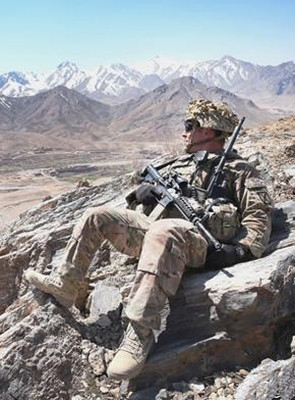军装
Out of sight
真正隐形
Expense and stupidity too big to camouflage
迷彩服也不再能伪装目标巨大的支出和愚蠢
“I WEAR camo so I can feel safe,” says Sean, a member of the navy reserve. He cannot quite fathom why his combat uniform is different from that of other American servicemen in the field, depending on whether they are members of the army, the air force or the marines. And soon it may be different no longer; for after years of ludicrously expensive design rivalry, the defence appropriation for 2014 prohibits the services from designing new uniforms, unless they will be used by all members of the armed forces.
海军预备役成员肖恩说:“迷彩让我觉得安全。”他始终不能理解,为何根据军种的不同,作战的陆军、空军和海军的作战服样式不同。但这种现状即将改变,在数年荒唐可笑、花费巨大的设计竞赛之后,2014年国防拨款严禁军队设计新制服,除非该种制服能够用于全军。
Remarkably, the Department of Defence has no single department dedicated to researching, developing and procuring the best uniforms for all troops. This caused no problems before 2002, when nearly every serviceman had a choice between a greenish camouflage uniform or a “coffee stain” desert pattern. But over the past 12 years the services have each created their own style of camouflage. The effect has been both costly, and occasionally embarrassing.
但请注意,国防部并无专门部门负责研发和生产适用于全军的服装。在2002年之前,这不是问题,因此那时每个军人只有两种选择---绿色迷彩服或者咖色沙漠迷彩。但十二年过去了,各个军队都设计了自己的迷彩服。这不仅带来了浪费,有时还意味着尴尬。

The marines led the way in 2002 with a versatile and effective new combat uniform, which also served to boost corps morale because the marine insignia was embedded in the design. This inspired a cascade of one-upsmanship among the other services. The air force, for instance, spent several years and more than $3m designing a new “tiger-stripe” uniform that proved unsuitable for combat—the camouflage was ineffective, the trousers were uncomfortable and the fabric was too heavy, leading to “heat build-up”. The navy spent a lot less money developing the “aquaflage” uniform; but that is a silly blue ensemble that works best where sailors may least wish to blend, in the water.
海军陆战队在2002年率先发布了一款全能高效的新型作战服,该款服饰的设计包含了海军陆战队的队徽,因此对鼓舞士气也有奇效。这在全军掀起了一股争先浪潮。比如,空军部队耗时数年,斥资逾300万美元,设计了一种新型“虎纹”制服,但这种制服却不适合作战---它的保护色无用,裤装不舒适,布料太厚不利散热。海军用较少的花费,设计了所谓的“水蓝”军服(aquaflage),这套愚蠢的蓝色制服看上去只有在水中—海军最不愿意隐藏的地方—隐藏效果最好。
The worst offender has been the army. The service spent years and about $3.2m developing its own “universal” camouflage. This pattern was designed to work anywhere, but proved useless nearly everywhere. Soon after it was introduced in 2005, soldiers in Iraq and Afghanistan began complaining that the pattern turned them into targets. Troops from Syria and China were clearly better equipped. Reports suggest that a high-ranking military official had chosen the pattern without consulting the data from years of studies. The army is said to have spent at least $5 billion on uniforms and equipment printed in this camouflage, which is still in use. In an emergency measure, the army kitted out soldiers in Afghanistan in a new pattern starting in 2010, spending more than $38.8m on replacement gear in fiscal 2010 and 2011.
最糟糕的设计来自陆军。陆军花费数年和约320万美元设计了一种所谓的“通用”迷彩。按照设计,它本该适用所有地形,但最终发现,它几乎在所有地形都派不上用场。2005年,在该种迷彩推出后不久,伊拉克和阿富汗的美国士兵就开始抱怨,说这种制服使他们成了活靶子。连叙利亚和中国的军队都明显比美军军备精良。调查显示,一位位居高位的军官在没有参考多年调查数据的情况下就选定了这种设计。据称,陆军至少砸了50亿美元在该种制服和迷彩上印的设备上。目前,这种迷彩仍在使用中。2010年,作为应急措施之一,陆军为驻伊拉克的士兵换上了新型样式的服装,据称这个过程花费了2010、2011年的财政中的388万美元。
Part of the problem, explains Timothy O'Neill, a retired lieutenant-colonel and camouflage expert, is that officers can be a bit too preoccupied with a uniform's “CDI [chicks dig it] factor”. This vanity, together with bungled trials, missteps and a lack of co-operation, put the cost of developing these uniforms at more than $12m, according to a report from the Government Accountability Office (GAO) in 2012. This does not include the extra costs—which the GAO estimates in the tens of millions of dollars—of managing the stock and supply of so many different combat uniforms. Nor does it include the high costs of replacing ineffective camouflage in the field. The armed forces spent around $300m on camouflage uniforms in 2011 alone.
退休上校、迷彩专家蒂莫西·奥尼尔指出,问题一部分出在军官们过于关注军装华而不实的效果。根据美国政府问责局(GAO)2012年的一份报告,这种虚荣心,加上被搞砸的实验,失误和欠缺合作,使得开发这些制服的费用超过了1200万美元。这还不涵盖其他额外费用(根据政府问责局估计,单单这一块费用就数以百万),包括管理这些种类繁多的作战服的储存和供应。更不要提替换在战场上效果不佳的迷彩服的费用了。仅仅在2011年一年,全军花费在迷彩服上的费用就高达3亿美元。
Stunned by these price tags, Congress in 2010 directed the Department of Defence to raise standards and cut costs. But little has been done. Many soldiers see the wisdom of returning to a shared uniform. But not the marines, who will stick to their pattern “like a hobo on a ham sandwich”, in the words of General James Amos, commandant of the marine corps.
被这些价格标签吓到,国会在2011年令国防部提高标准,降低成本。但应对措施不多。许多士兵看到了重新开始共享同款军服的好处。但海军陆战队不这么想,海军陆战队总司令、上校詹姆斯·阿莫斯说,海军陆战队队员对他们自己的设计就像“流浪汉对火腿三明治”。
It is unclear what all this means for the army, which has been spending millions of dollars testing different patterns for a new camouflage since 2010. It recently started tests for possible new uniforms, which will continue until the end of September. Replacing the service's flawed camouflage and equipment could cost another $4 billion over five years, according to the GAO. “Research and development in government is always a long and painstaking process,“ says Mr O'Neill. “But if it were easy, then the government would waste even more money, and faster.”
这一切对全军意味着什么,现在还不清楚。自2010年以来,全军在一种新型迷彩的测试上已经花费了上百万资金。最近,它又对一种疑似新军装展开了新一轮测试,测试将一直持续到九月底。政府问责局称,在未来五年,替换军队中存在缺陷的迷彩和装备将花费400万美元。奥尼尔说:“政府的研发过程总是路漫漫其修远兮,但如果这个过程过于简单,那么政府会浪费更多的资金,更加草率。”译者:杨雪













